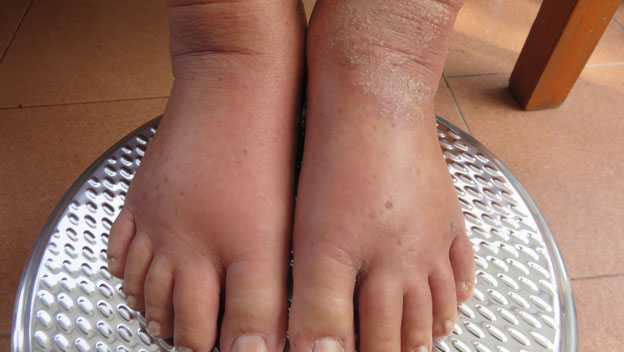The legs are a part of the body that tend to get swollen from time to time. This may occur for different reasons. Some more serious than others. Listed below are some of the reasons.
Standing or Sitting Too Long
Being on your feet for long periods of time can cause swelling in your feet by decreasing the blood flow to your extremities. Additionally, the effects of gravity on your legs can cause fluid to pool in your feet and ankles. Similarly, spending hours in a chair without breaks to stretch and move your muscles can decrease circulation to your feet. This is something that happens commonly during long haul flights. Compression stockings may help with the circulatory problems caused by spending long hours on your feet. If you have a desk job that has you sitting for long periods, try to stand up and walk around for five minutes every hour. If you find yourself on a long haul flight, be sure to walk around on the plane.

Medications
Some prescription medicines may have the undesirable side effect of causing swelling in the feet or ankles. Several prescription and over-the-counter drugs can cause swelling of the feet or ankles. They include certain blood pressure medications, non-steroidal anti-inflammatory drugs, hormone replacement therapies, and certain ulcer medications. Speak to your doctor if you start to notice swelling in your legs after commencing a new medication.

Pregnancy
Pregnancy comes with many body changes, and swollen feet and ankles can be one uncomfortable symptom of this condition. Some of the things that can make this swelling worse include warm temperatures, long days of exertion, low potassium levels, and high consumption of caffeine or sodium. Elevating the legs and wearing compression stocking can help relieve the swelling in the legs during pregnancy. The proper way to do this is to lie flat on your back and elevate the legs using a pillow underneath the legs. Pregnant women may wish to avoid standing for long periods of time. Leg swelling in pregnancy may sometimes be a symptom of pre-eclampsia, a life-threatening condition involving high blood pressure, protein in the urine, and sudden fluid retention.

Lymphedema
Lymphedema is a condition in which the lymphatic system does not work properly, causing swelling in the body’s tissues. The lymphatic system is a network of channels and glands throughout the body that helps fight infection and remove excess fluid. It can affect any part of the body, but usually develops in the arms or legs. This can occur due to infection, cancer, scar tissue, or inherited diseases. Exercise, compression, massage, and the use of compression sleeves or stockings may help treat this condition.
Kidney Failure
Swollen ankles, puffy eyes, dry skin, itchiness, and fatigue are all symptoms of kidney disease. When the kidney is not functioning properly, toxins that should normally have been filtered out tend to build up in the body and this presents as generalized swelling of the body which is more pronounced in the legs.

High Salt Intake
Eating a diet high in salt can cause water retention that results in swollen feet or ankles. The recommended amount of sodium is less than 2,300 mg of sodium each day. Hidden sources of dietary sodium include items such as canned soups, processed tomato sauces, chips, cheese products, and processed meats. To decrease your daily salt intake, avoid adding extra salt to your foods. Instead, season your meals with herbs and spices.

Blood Clot
If you develop a blood clot in the veins of your legs, the decreased blood flow may result in swelling of the feet or ankles. These blood clots, known as deep vein thrombosis (DVT), put you at risk for a pulmonary embolism. A pulmonary embolism (PE) occurs when a blood clot breaks free and travels to your lungs. Symptoms of DVT include leg pain, swelling, and redness. Symptoms of PE may include chest pain, shortness of breath, and lightheadedness. Having certain types of surgery can increase your risk of having blood clots. If you notice swelling and pain in your legs after a major surgical procedure you should alert your doctor immediately.

Congestive Heart Failure
Congestive heart failure (CHF) occurs when the heart is unable to pump blood to the rest of the body efficiently. CHF can cause swelling in body tissues as the blood attempting to return to the overworked heart backs up. Warning signs of CHF include shortness of breath, wheezing, swelling in the ankles or other body parts, fatigue, and nausea. Confusion and a rapid heart rate may also indicate CHF.

As you may have noticed from the above list, swelling in the legs can occur simply because you’ve spent too much time on your feet and will resolve by itself in no time, or it could be a sign of an underlying medical condition.
If you notice that your legs/feet get swollen on a regular basis with no identifying trigger then you should see your doctor for possible investigations.







